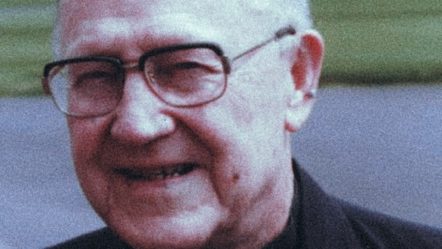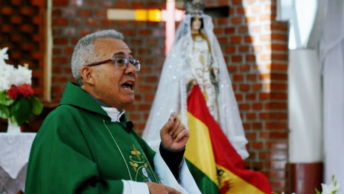Columban priest Aedan McGrath spent over two years confined in a Communist prison in China during the 1950s, where he suffered both physical and mental torment at the hands of his captors.
In 1980, he met Pope John Paul II in Rome.
“Father,” the Pope asked McGrath, “what kept you sane in prison?”
McGrath confidently replied, “Holy Father, I have no doubt in the world, that it was de Montfort’s True Devotion to Mary.”
Pope John Paul II broke out in laughter.
“Do you know what kept me sane in Poland when I was a student running from one house to another, studying theology and philosophy?” he remarked. “I found a little book on a table, and it’s been in my pocket ever since.”
He pulled out a tattered copy of Saint Louis de Montfort’s True Devotion to Mary.
Mary’s Instrument
Nearly five decades before that meeting, Aedan McGrath (pronounced McGraw) arrived in China. In 1947, Archbishop Antonio Riberi tasked him with spreading the Legion of Mary throughout China before the Communist takeover. McGrath traveled 4,000 miles in four months at a grueling pace to establish groups as war raged between the Communist and Nationalist forces. Within two years, he helped to establish 2,000 Legion groups in China as the Communists tightened their grip over the country.
Despite the good work the Legion of Mary did for the Chinese people, the organization’s success and its members’ strong faith alarmed the Communists. By 1951, the Communists dubbed the group “Public Enemy No. 1” and outlawed it. Thousands of members were imprisoned, tortured, and in many instances, murdered. Pope Pius XII called it “the greatest persecution in the history of the Catholic Church.”
Arresting the “Generalissimo of the Legion of Mary” — aka McGrath — became the Communist government’s top priority. Around midnight on September 6, 1951, police officers swarmed the Columban rectory in Shanghai and arrested McGrath for espionage, and two armed guards shoved him into an awaiting car destined and sped off.
Suffering for Christ
“Nobody wanted to live in a Communist prison,” McGrath admitted. “Not for 10 minutes.”
He spent 973 days, or 23,352 hours, in one.
When he arrived at Lokawei Police Station, an officer shoved McGrath into the corner of a room while another kept a machine gun aimed at him. The guards removed his glasses, rosary beads, and medal chain from around his neck. They also stripped him of his shoelaces and the buttons from his shirt, so he couldn’t use the shoelaces to hang himself or swallow the buttons.
After seven months at Lokawei, the Communist guards abruptly transferred McGrath to the larger Ward Road Prison.
Life in Lokawei was torture, but Ward Road had its own horrors.
Most cells housed four or five prisoners, but the guards isolated McGrath. They handed him a dirty aluminum container with little rice, a mouthful of vegetables, and a pair of soiled chopsticks. He left his mug behind at Lokawei, so he only had a tiny vessel that held a couple of mouthfuls of water.
Soon after arriving at Ward Road, a guard came to his cell and ordered him to roll up his sleeping mat and bundle his blankets together. The guard led McGrath to the second floor and placed him in another cell.
“You were never allowed to close your eyes in the daytime,” McGrath recalled. “And each time they find you with your eyes closed they punish you.”
He was not permitted to stand, sit, or lie down without permission. The guards routinely ordered the prisoners to stand up or sit down for no specific reason. This humiliation and torture took a psychological and physical toll on them.
A little sparrow that visited McGrath’s cell proved to be a blessing, and he fed a little rice to his winged friend. The sparrow not only provided him with a companion but also acted as an alarm system, chirping when a guard approached the cell.
“I noticed now and again he would whistle, fly away, and sit on the top window. And 10 seconds after he flew away the guard came,” he stated. “So, when the bird came back, I could relax and close my eyes and sing a little song to myself, and so on.”
After several months, the guards shifted McGrath to the fourth floor. He managed to communicate with the foreign prisoners in the adjacent cells. A Yugoslavian prisoner came to the cells with rice twice a day. McGrath befriended the man, and he smuggled notes to other prisoners written on pieces of brown toilet paper with a nub of a pencil. It permitted McGrath to instruct the prisoners on the Catholic faith. He even wrote the Sermon of the Mount and prayers for an American Protestant prisoner. The man told McGrath that even though he did believe in the Immaculate Conception, praying to God through Mary lifted his spirit, saying it “was like putting aviation gasoline into a jeep.”
On the evening of March 24, 1953, the guards moved McGrath to solitary confinement on the infamous fifth floor. The small cell was the length of his body. The suffocating heat in the summer and unbearable cold during the winter added a whole new set of hardships to his prison sentence.
“I dreaded excessive heat all my life,” McGrath noted. “Floor Five, Ward Road Jail was my ultimate nightmare.”
From noon until sunset the sun’s rays bore down on his cell. The bars became so hot that he couldn’t touch them and had to lie his face close to the entrance to get a wisp of fresh air. Even after 5 p.m., the temperature remained close to 100 degrees in the cell. It caused the walls to give off an intense moldy smell, adding to McGrath’s torment. Even in sleep, the vermin and insects, the worse being bedbugs, crawled up from under the floor and out of their holes onto McGrath’s body. He wrapped the numerous bites on his arms and the backs of his legs with rags to ease the pain. He also suffered from lumbago, an excruciating earache, and constipation. While he found unconventional ways to communicate with prisoners on the fourth floor, it was impossible for him to do this on the fifth floor.
Peace in Hell
These hardships pushed McGrath to the breaking point. Several prisoners on his floor went mad.
“I understood as never before how easy it might be to go insane in this place, to lose hope and give up the battle,” he confessed. “But the grace of God sustained me in my hour of need.”
Like a hermit, he maintained a strict schedule of prayer, meditation, and study — and filled every moment from morning to evening. He started the day by meditating on some text from Scripture. After breakfast, he “took a walk” of three steps back and forth in his cramped cell, reciting the “Te Deum” and the “Magnificat.” Following this exercise, he celebrated mass and took spiritual communion.
Then came his study period. He translated Gospel passages into Latin or analyzed hymns in his head since he had no paper or pencil. He even drafted imaginary letters in Latin and French and composed 35 poems in English.
After his study, he recited three rosaries and the Legion of Mary prayers and again paced back and forth in his cramped cell. He continued his study, followed by a visit to the Blessed Sacrament.
Dinner arrived around 2 p.m. After he ate, McGrath recited the “Miserere” and “Benedictus” and sang more songs. Another study period followed, and he recited three rosaries and Legion prayers.
In the late afternoon, McGrath sat down and practiced writing Chinese characters by drawing each character with his finger on his knee.
During the evening, he “attended” the benediction of the Blessed Sacrament, reciting hymns and prayers. Lastly, he prepared his meditation for the next morning, and made an examination of conscience.
The whistle sounded for bedtime at 8 p.m., and he laid out his quilts on the cell floor and went to sleep, starting the same routine the next day.
McGrath found inward happiness, self-worth, and peace knowing that his imprisonment was serving a greater purpose — suffering for the sake of Christ.
“I was never as peaceful in my life as in that prison,” McGrath later declared.
He had found peace in hell. The Communists could never break his spirit, regardless of how hard they tried, as long as he maintained his faith.
His little friend, the sparrow, also visited him on the fifth floor. He saved a few grains of rice for “the chirping angel of comfort.” The moment a guard approached, he spread his wings, let out a few chirps, and flew off, warning McGrath to stop praying aloud or singing.
“My flying guest helped to ward off despair at a time when I was oblivious as to what was going on in the outside world,” he fondly recalled.
Days and months passed by when a guard unexpectedly came to McGrath’s cell door and ordered him to pack his things. He could hardly walk since his legs were soft and weak. The guards returned his wristwatch, rosary beads, medal, belt, and everything that they took from him over two years before.
On April 28, 1954, Saint Louis de Montfort’s feast day, the Communists expelled the 48-year-old Columban priest from China. Guards transported him to the Hong Kong border with two other Catholic prisoners, Monsignor Gustave Prévost and Father François Legrand, and turned them over to the British military police.
In July, the Columban priest returned to Ireland and received a grand reception at Dublin’s National Stadium. He took all the praise humbly, saying that he never knew what grace was until he spent time in a Communist prison, and that ever since leaving his cell he “felt a pang of regret.” McGrath felt unworthy of the acclaim since tens of thousands of Catholics made a similar sacrifice and were still doing work in secrecy for the church in China. He never felt closer to God than during his captivity.
What We Can Learn
There are several things we can learn from Father Aedan McGrath’s confinement and torture.
Like Jesus, even as he was tormented by his captors and in great pain, McGrath put others before himself. It’s one thing to help someone when everything is going well, but it’s another matter to help a person when your day isn’t. It doesn’t go unnoticed by God.
McGrath demonstrated it’s possible to find peace during affliction. A balance of prayer, meditation, and study, and resigning yourself to God’s will, will allow you to navigate it and ultimately endure. Routine and balance can help you stay grounded when you’re surrounded by chaos. Let Jesus take the weight of stress and anxiety off your shoulders.
Know that when you’re suffering, you’re doing so for God. While imprisoned in the Tower of London for his faith, Philip Howard, the 13th Earl of Arundel, wrote on the prison’s walls, “The more affliction we endure for Christ in this world, the more glory we shall obtain with Christ in the next.” McGrath was bolstered by the same conviction hundreds of years later. Know that when you’re suffering, it’s serving a higher purpose. And you’re never closer to God than when you’re suffering.
Lastly, there is tremendous power behind praying to the Virgin Mary. She is the closest and most direct link to Jesus. She birthed him, raised him, and buried him. There is no better way to understand and appreciate Mary than by reading Saint Louis de Montfort’s True Devotion to Mary. I’ll admit, it’s not a simple read. But try digesting a chapter, a section, or a few sentences at a time. There is deep meaning behind Montfort’s words. Pope John Paul II, Aedan McGrath, and many others found this book a source of comfort in the darkest periods of their lives. You certainly will too.








